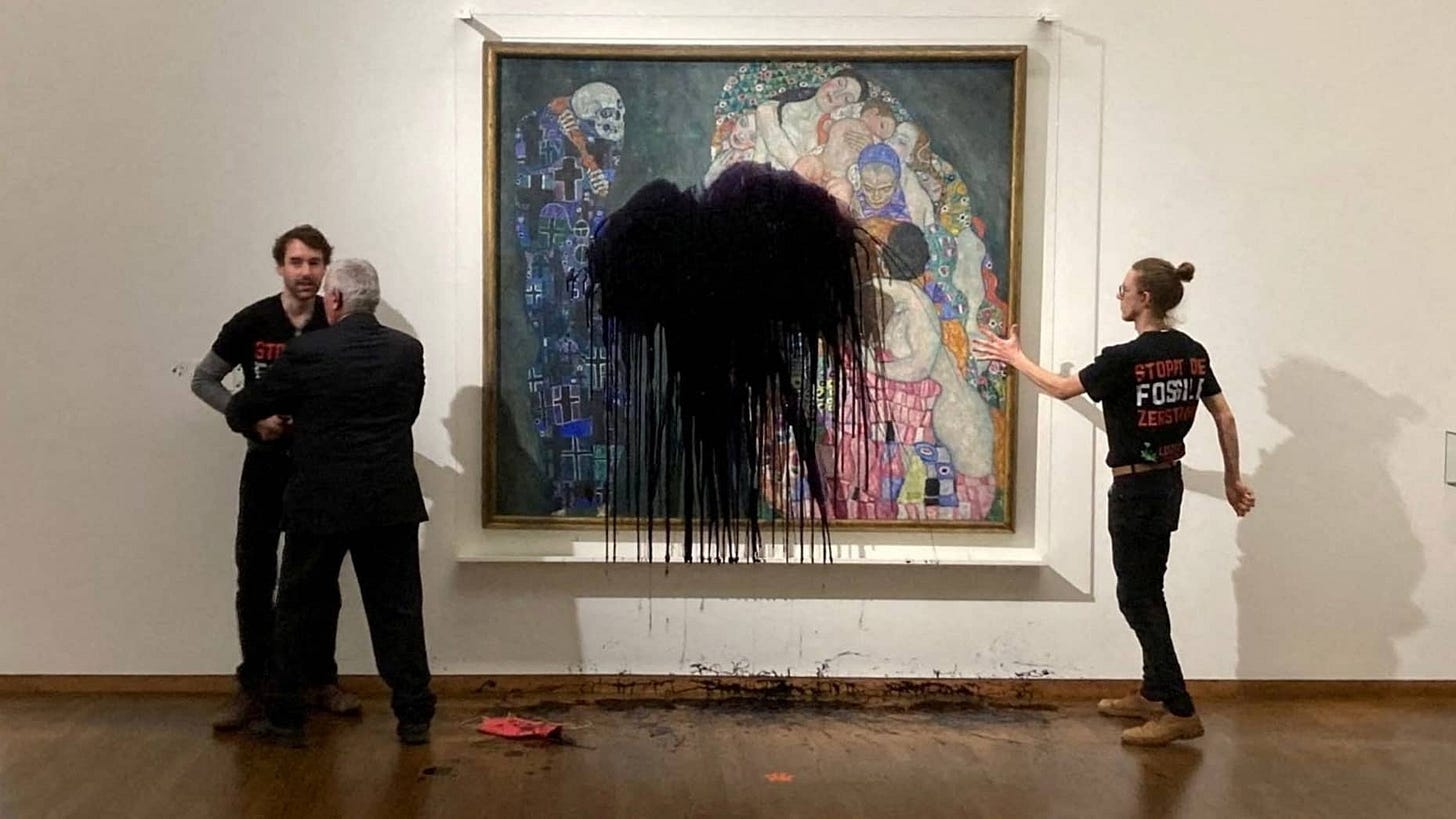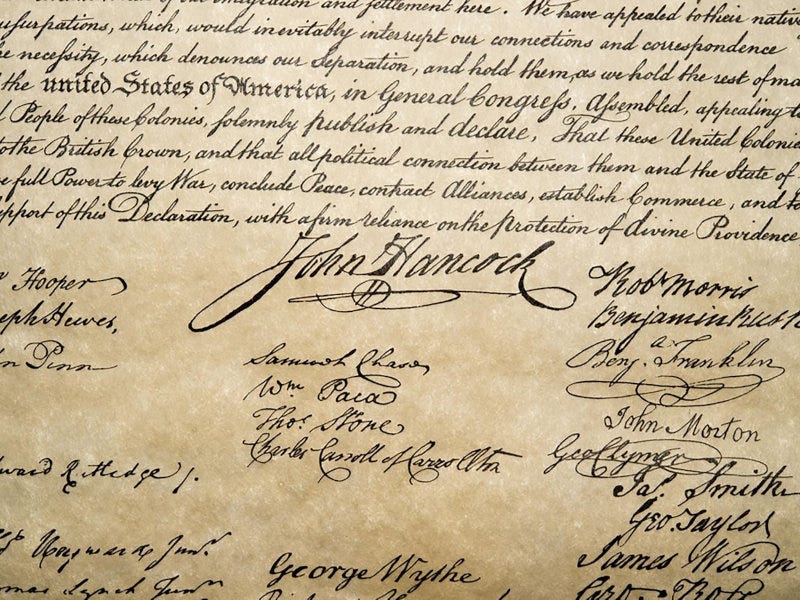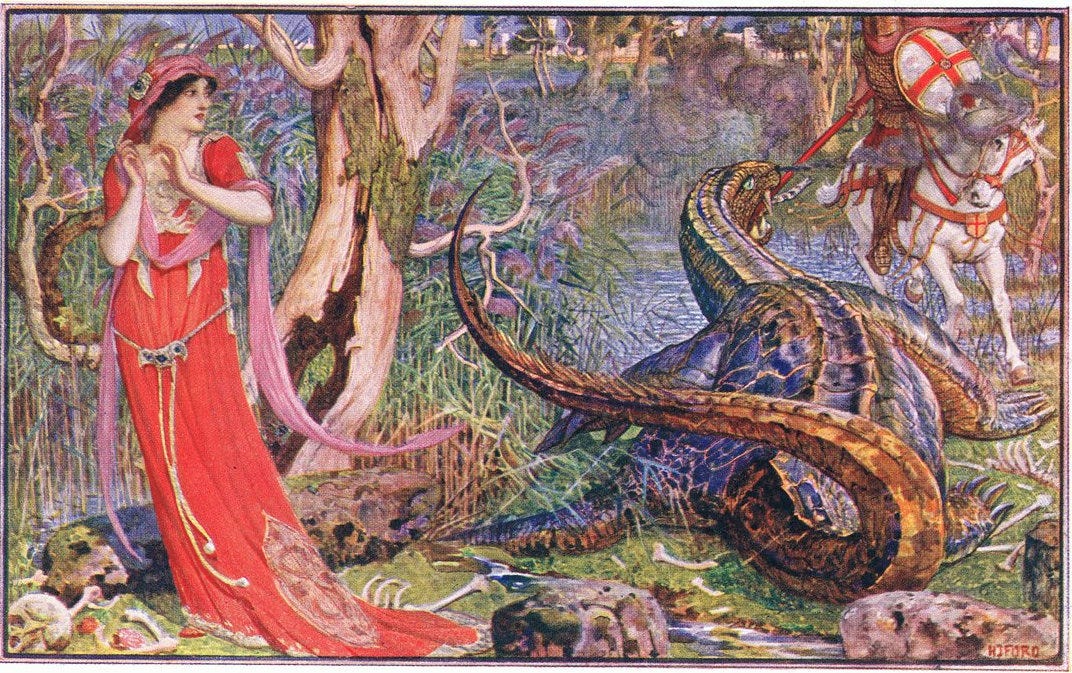When I started this blog in September of 2022, I didn’t consider myself a writer. It still amazes me that more than 3,200 of you out there on planet Earth apparently disagree.
Thanks for that.
I had no particular vision for what I was doing. No benchmarks, no “subscriber growth plan”, no grand scheme or business strategy. I only knew I needed to say a few things out loud, even if it turned out I was just howling at the moon.
The reason I needed to say those things is complicated. My life back then was strange and new. I had seen some things I couldn’t unsee, as the saying goes, and was transformed in the process. I understood there were other layers of reality that we couldn’t normally perceive. My experiments with the darkest of these layers blew up in my face, so to speak. But instead of killing me, I was jolted wide awake. I suddenly remembered who God was, why Christ came. He saved me at the brink.
Grace is grace, so I didn’t question that part. Instead, I decided to use everything I had ever learned, every skill and tool, to track our common Enemy to its hidey holes. It wasn’t some spaghetti-western revenge quest. It was and remains a snake hunt. Turns out that’s how I was made. I’ll keep at it, for as long as God wants me to.
Now, the thing about snakes is this: some of them are dangerous. It doesn’t matter if you’re afraid of them or not, or even whether you believe such snakes exist. Danger doesn’t work like that.
But the thing about danger — the secret, hiding in plain sight — is this:
Danger is another word for Life.
These are synonyms for the property of uncertainty that separates ordered, dynamic matter (a tree, a squirrel, your dear Aunt Mabel) from elemental “stuff” like rocks and water and fire. All real things exist in transition, moving from one energetic state to the next. A transition from order to disorder might take a million years, like the erosion of a mountainside, or a microsecond, like stepping off the curb without looking both ways. But a member of the elemental group is never in danger during such transitions, because it has no choice in determining the new state.
We find edge cases in our constructed things, such as machinery and art. We could say, for instance, that a stone is never “in danger” of a hammer, but a statue can be in danger during transport, a book can be in danger near a bonfire, a building can be endangered by bulldozers and bombs. If your Pontiac Firebird is teetering on the edge of a cliff, it might fall off that cliff, and become disordered as a result. Welcome to the birth of insurance.
It’s the uncertainty of outcomes and the threat of bad ones that makes a thing interesting at all. And so, the more interesting and “precious” things that humans lend order to with our minds and hands retain a property that’s superficially similar to life. Yet Michelangelo’s David still won’t ever be alive, because it lacks the ability to take risks in pursuit of gains. It can’t place itself in danger, any more than a pool of water can put itself in danger of being splashed or drained.

All of this might seem obvious to you. The problem is that we often don’t treat it that way, and reject what’s simple and obvious for some convoluted explanation that inverts the truth. I’ve noticed this happens all the time when we discuss the concept of “safety”.
By the same logic that Danger is another way of saying Life, Safety is another way of saying Death. There was no man in the world safer than my father when his body was rolled into the crematory oven. A dangerous life is God’s gift to Man, whose mind can imagine future goods and take meaningful risks to achieve them. The risks we take can include all kinds of stakes, including the stake of all future dangers.
What does it mean to risk your earthly life?
In the end, our bodies will succumb to disorder eventually, no matter what we do to protect and preserve them. They are precious gifts, but not so dear that we’d pay any price to keep them safe. That would be stupid. You will lose it anyway, no matter how many risks you take or avoid.
So the question before us therefore isn’t “How do we avoid danger?”, but how best to choose our dangers and approach them. We can and do manage risks, and mitigate the stupid ones to a degree. But that doesn’t mean we refuse to take them. It’s the difference between turning our backs to the mountain and choosing the right tools to climb it. Wisdom means choosing the right mountain, the right future.
The more we come into alignment with God’s will, the wiser we’ll be when charting our courses towards future states. But chart them we must, because our bodies were not made to pursue safety at all costs.
In fact: why would you ever assume they were? Did you think you would live forever in your fragile skin? Pregnancy can kill a woman. Think about that.
In light of these obvious facets of reality, safety for safety’s sake becomes a form of madness, which will eventually lead men into the darkest woods of tyranny and ruin. If mitigating a given threat-matrix can serve a righteous purpose at all, then it would be to build a stable platform, from which we can take ever bolder and more interesting risks. The glory of God Almighty cannot be caged or contained, and so neither should his children’s quests to glorify His work, and spread His message of infinite joy and light as the covenant commands us.
Insane inversions and blasphemies abound in this terrain. There are people reading these digitized words at this very moment, who fancy themselves “traditionalists” of the Abrahamic line. As their eyes scan down the little black mirror, their minds fill up with bloody cartoons of some glorious past they never visited, but which they pretend to spiritually inhabit and immanentize. It never occurs to them that they’d be murdered as alien witches in those lost districts of reality. They can’t investigate the hidden angles of their souls, see themselves as the products of modernity that they are. “But, I Tweet about my religion!” they Tweeted.
The lunacy of these hypocritical cyber-Luddites — decrying the very technology they’re addicted to, while pretending to the holy purpose of its destruction — is only baffling if you’re completely blind to the Enemy’s demented tactics. Every molecule of their lives is a shabby lie: the clothes they wear, the comforts they enjoy, the dangerous tools they neither built nor comprehend. And at the bottom of these self-deceptions, the unholy lie that they would discard it all for the glory of God.
Well then, what are you waiting for?
Discard it, I say!
Smash your little black mirror with a hammer. No, no, not a hammer. Unless you made it yourself, that hammer is filthy with Satanic technology. Use a stone. But make sure it’s not a quarry stone, chiseled by a mech.
Unplug yourself from The Great Machine. Break every wicked tool in your possession. Burn your cheap, imported clothes. Rebuke the vile supermarket, and the dread queen Amazon. Rebuke your local grocer too, who employs the White Man’s witchcraft of refrigeration. Buy a goat instead. Buy two goats.
Again, what are you waiting for?
RETVRN TODAY, for your time on Earth is running short. Get busy reconstructing that arbitrary dot on your imaginary timeline, the moment you think was somehow the most perfect, the most sacred, the most complete in itself. Did they have the wheel back then, or is that too much “progress” for your fantasyland? Never mind. Details, details. Recreate that fantasy state as best you can, then strive for your whole life to stabilize and maintain it, to make it safe from all danger, to protect it from all possibility of change. Build your little snowglobe world, and glue yourself inside it, friend. Just know that you do this in defiance of your Creator.
But the truth is that most of these folks won’t be doing any of that. Even the Amish cheat. What you’ll mostly hear is lip service, and rationales to disguise their cowardice or sloth.
Some of them have been led entirely astray. They worship a creature wearing a mask of God. An imposter who affords them the freedom to lie as easily as they breathe, including to themselves.
It whispers to them:
Hurry not, my beautiful, brilliant, perfect child.
You can do all of those things tomorrow, or the next day, or the day after that.
Today will be another day of rest, for you. Today you may spam links to chatrooms, or retweet a politician’s boast, or fantasize about sacred murder and holy rape. Today you may Netflix and chill.
There are other whispers, other lies. But they all lead down the same dark path to apathy and ruin.
Here, kid: memorize this book. Recite it on command. Stab anyone who doesn’t. Police all words. Crush all creativity. Smash all innovation. End all dangers. Flatten all curves.
It’s much safer that way. Easier, too.
As for the rest of us, we are tasked to build and grow. We must be fruitful and multiply, fill the earth and subdue it, have dominion over all Creation. That was the promise made, the last time total catastrophe loomed over us. When God commanded Noah, He did not say, “Learn to swim like a fish.” He told Noah to build an ark, and to rescue what he could of His beloved creations.
As
recently noted, we are once again faced with the threat of total ruin. This time, the threat is not a fire or a flood. Macris ticks off many of the material challenges at hand, and does the math for us. But he knows as well as I do that the greatest challenge is ultimately spiritual in nature:As it reached the precipice of environmental, technological, and societal upheaval, the Faustian soul faced a reckoning. It is here that the Aenean spirit began to emerge—a soul animated not by ambition for ambition’s sake, but by the delicate knowledge that humanity stands at a threshold, a liminal space with a clear choice: to transcend or perish.
Named for Aeneas, the hero of Virgil’s Aeneid, who fled the ruins of Troy to found a new and greater Rome, the Aenean soul embraces the duality of destruction and destiny, of depletion and rejuvenation.
The Aenean soul is defined by its understanding of humanity as poised on the brink of cosmic destiny, aware of our uniqueness in the universe, and yet haunted by the specter of extinction, the Great Filter that looms ominously in our future. It seeks to establish a new civilization that, because threatened with existential perils of collapse, is thereby driven to transcend Earth’s boundaries to ensure human survival.
Many will be content to sit and watch the game play out on television — or even to jeer and heckle from the sidelines. It could be that they simply aren’t up to the challenge. That they just lack the intelligence, the imagination, the work ethic, and the courage to even assess the challenges ahead, let alone to try to overcome them. But I suspect there are darker customers in their midst, who cheer for megadeath because their whispering master commands it.
The rest of us must do as the God of Heaven commands us. We must build our own arks. Use His gifts as He intended.
We must do our very best, to rescue what we can.
Did Mark just compare Elon Musk to Noah?
Uh, “No.”
But I’m guessing that’s the face that materialized when many people watched The Catch. As if Elon built “the chopsticks” in his garage, and steered them using one of his dumb neural implants. Video game bullshit. Cartoon logic.
What they probably didn’t imagine were the hundreds or thousands of minds that applied themselves to the challenge, and all the risks they took and sacrifices they made to overcome it. They don’t realize how much could go wrong, how much could fail. Anyone who’s been involved in a complex enterprise of scale knows what I’m talking about.
What they also may not have imagined is the millions of minds that were rooting for failure, for that booster to crash and burn. Some of them were trained to perceive every such challenge as a Tower of Babel, an affront to God. Others are like those soul-dead folks who attend stockcar races hoping to see one careen off the track. Lately, I’ve begun to suspect the former is merely a rationale for the latter. A mask for that ugly, wretched, Satanic appetite.
Did I see the ark?
No.
Not yet, at least. But we cannot create as God creates. We must stumble forward through the minefields, fail and fail again. We must still follow the rules, of course, which Christ explained to us in words and by example.
Being Unconquerable
The place where Madam Bisone and I are currently staying is filled with ghosts of many species. Some are perhaps “stone tape” recordings of past wounds. Others are memories, or thoughtforms lighter than neutrino clouds. I detect the fingerprints of a few darker customers on these premises as well. I know that’s largely my fault. I’m learning to forgive …
We are not Him. We don’t even know all the questions, let alone the answers. We are still building the languages to ask these questions, slowly and imperfectly.
But to allow ourselves to be paralyzed by worry and fear is a mortal sin, an affront to God’s great gift of uncertainty. Our goal isn’t to attain and conserve some state of permanent equilibrium. Again: such a state is equivalent to Death Itself, and would mark Satan’s final victory and vengeance.
The Luciferian pretends to love uncertainty, and to reach for “progress” along the limbs of the tree. But he does so for his own glory, not for God’s, and will skirt all rules in the effort. His “fruits of progress” therefore end up being numbing drugs and toxic foods, plus twenty million distractions and amusements designed to keep you fat, slow, stupid, inert, content, and, most of all, safe. To keep you from thinking dangerous thoughts, doing dangerous things, living dangerous lives.
In extremis, with the right amount of hubris and enough cash piled away, maybe you’ll try to conquer Danger itself. You might pursue ultimate safety by hiding in your underground bunker, strapped into your padded bed, hooked up to fancy machines that feed you nutrients, circulate your blood, tend your bedsores, change your diapers. But what good could ever come of it?
When was the last time you asked that question honestly?
What good could come of my fragile, fleeing life, during this little window of spacetime I’ve been afforded to act in the world? How do I do my very best with what my Father has given me?
Which dangers will I choose to face along the way?
What will I risk in failure, and why?
I am an “accomplished” sinner. By this, I mean I have sinned in just about every way you can imagine, short of the kind of irremediable crimes that would get you locked you up in jail forever. But it was only recently that I came to recognize the great sin of safetyism.
I realize now that I’ve risked too meekly in the past, held my comforts too dear, guarded my own skin too jealously. While I was never a Safety Cultist, the risks I did take were often meaningless ones, in pursuit of cheap trinkets and cheaper thrills. Even the “dangers” of life were distorted through that grimy old lens. I was taught to fear vast, invisible monsters, which allowed the current army of gibbering goblins and mutated clowns to burrow themselves deep inside every institution and authority. Shame on me.
In case you missed it: a page has turned.
We don’t yet know the full contents of the next one. We live in time, so we must read and write the book in order. There are miles to go before we sleep, much dangerous work yet to be done.
Be not afraid of the danger.
Be thankful for it.
The Cat Was Never Found is a reader-supported blog. I don’t publish much paywalled content, so your generous patronage is very much appreciated.
P.S. If you found any of this valuable (and can spare any change), consider dropping a tip in the cup for ya boy. It will also grant you access to my “Posts” section on the donation site, which includes some special paywalled Substack content. Thanks in advance.







Mark, you are a very gifted writer in my humble opinion. I first became aware of your substack when someone guest-posted your excellent essay, "Devil Worshipping Aliens From the Abyss". I was blown away by it! You really should consider developing it into an epic along the lines of Tolkien's Lord of the Rings or C.S. Lewis' Chronicles of Narnia.
Your argument against 'safetyism' makes perfect sense. Countless acts of evil have been committed by ordinary people out of mortal fear. Anything to postpone the inevitable. Yet to me having to live with the knowledge of having committed a heinous act out of fear and self preservation would be worse than death. I can't imagine wishing death on others from irrational fear of a virus. But plenty of people did that. "Stay safe", they'd say. And they delude themselves that they are the good people, so self-righteous.
You're so so right. "If I am sure of anything I am sure that [Christ’s] teaching was never meant to confirm my congenital preference for safe investments and limited liabilities…” C.S. Lewis, The Four Loves